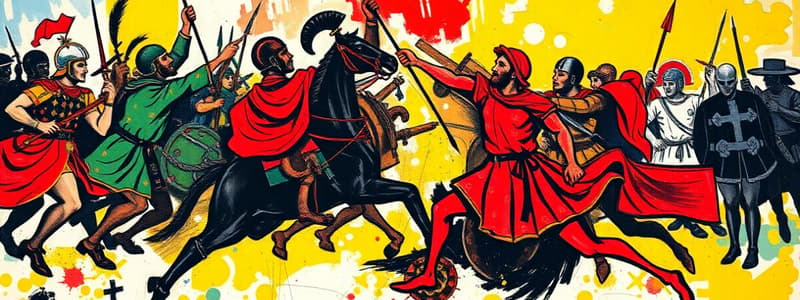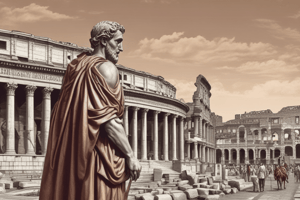Podcast
Questions and Answers
What was the significant consequence of Pompey withdrawing his support for Caesar?
What was the significant consequence of Pompey withdrawing his support for Caesar?
- The Senate unanimously supported Caesar.
- Caesar became a dictator immediately.
- Pompey and Caesar turned into bitter rivals. (correct)
- It led to a resurgence of the triumvirate.
What event contributed most to the division of Rome into factions supporting Caesar and Pompey?
What event contributed most to the division of Rome into factions supporting Caesar and Pompey?
- The uprising of Vercingetorix.
- The death of Crassus.
- The election of Pompey as consul. (correct)
- The end of the triumvirate.
What strategy did Vercingetorix use against Caesar’s forces in Gaul?
What strategy did Vercingetorix use against Caesar’s forces in Gaul?
- He forged an alliance with Pompey.
- He lured Caesar into a trap.
- He burned farmland and food stores. (correct)
- He rallied the Roman troops to his cause.
What dilemma did Caesar face when instructed to return to Rome?
What dilemma did Caesar face when instructed to return to Rome?
What would crossing the Rubicon River signify for Caesar?
What would crossing the Rubicon River signify for Caesar?
What was one of Julius Caesar's main objectives in obtaining the consulship of Rome?
What was one of Julius Caesar's main objectives in obtaining the consulship of Rome?
Which territory did Julius Caesar succeed in governing in 58 BCE?
Which territory did Julius Caesar succeed in governing in 58 BCE?
What was the reason Caesar constructed a massive wall along the eastern side of the Rhone River?
What was the reason Caesar constructed a massive wall along the eastern side of the Rhone River?
What did Caesar do to justify his actions against the Helvetii migrants?
What did Caesar do to justify his actions against the Helvetii migrants?
How did the Roman Senate respond to Caesar’s request for autonomy with his army?
How did the Roman Senate respond to Caesar’s request for autonomy with his army?
What significant event affected Caesar's standing with Pompey the Great?
What significant event affected Caesar's standing with Pompey the Great?
What was Caesar's financial situation as he took on more administrative responsibilities?
What was Caesar's financial situation as he took on more administrative responsibilities?
What was the cultural impact of Roman control on Gaul?
What was the cultural impact of Roman control on Gaul?
What was the primary reason the Senate granted Julius Caesar the power to take Gaul's army?
What was the primary reason the Senate granted Julius Caesar the power to take Gaul's army?
How did Julius Caesar exploit the beliefs of the Germanic war-leader Ariovistus?
How did Julius Caesar exploit the beliefs of the Germanic war-leader Ariovistus?
What cultural perspective did the Romans hold towards the tribes to the north, including the Germans?
What cultural perspective did the Romans hold towards the tribes to the north, including the Germans?
What internal conflict arose within the Roman Senate regarding Julius Caesar's actions during the Gallic Wars?
What internal conflict arose within the Roman Senate regarding Julius Caesar's actions during the Gallic Wars?
What was the outcome of the battle against Ariovistus?
What was the outcome of the battle against Ariovistus?
What happened to Julius Caesar's daughter Julia during the events described?
What happened to Julius Caesar's daughter Julia during the events described?
Who were the key political allies of Julius Caesar mentioned during the elections of 55 BCE?
Who were the key political allies of Julius Caesar mentioned during the elections of 55 BCE?
What official positions were granted to Caesar's allies following the elections held in 55 BCE?
What official positions were granted to Caesar's allies following the elections held in 55 BCE?
Flashcards
Why did Caesar want to govern Gaul?
Why did Caesar want to govern Gaul?
Caesar desired the governorship of Gaul because it was considered the most lucrative Roman province, offering vast resources and opportunities for wealth.
What was Gaul like before Roman conquest?
What was Gaul like before Roman conquest?
Gaul was a Celtic civilization spanning from Celtic Britain to northern Italy, with a rich cultural heritage.
Why was Caesar excited about governing Gaul?
Why was Caesar excited about governing Gaul?
Caesar recognized the potential for wealth and expansion in the lands beyond Roman Gaul, envisioning control over the entire region.
How did Caesar get the governorship of Gaul?
How did Caesar get the governorship of Gaul?
Signup and view all the flashcards
What was the Helvetii conflict?
What was the Helvetii conflict?
Signup and view all the flashcards
How did Caesar deal with the Helvetii?
How did Caesar deal with the Helvetii?
Signup and view all the flashcards
Why did some senators oppose Caesar's actions?
Why did some senators oppose Caesar's actions?
Signup and view all the flashcards
How did Caesar solidify his political position?
How did Caesar solidify his political position?
Signup and view all the flashcards
Caesar's ambition
Caesar's ambition
Signup and view all the flashcards
Ariovistus' defeat
Ariovistus' defeat
Signup and view all the flashcards
Roman Senate's division
Roman Senate's division
Signup and view all the flashcards
Crassus' appointment
Crassus' appointment
Signup and view all the flashcards
Roman expansion
Roman expansion
Signup and view all the flashcards
Pompey's support
Pompey's support
Signup and view all the flashcards
The death of Julia
The death of Julia
Signup and view all the flashcards
Caesar's strategy
Caesar's strategy
Signup and view all the flashcards
What ended the First Triumvirate?
What ended the First Triumvirate?
Signup and view all the flashcards
What sparked the Roman Civil War?
What sparked the Roman Civil War?
Signup and view all the flashcards
What was Pompey's role in the civil war?
What was Pompey's role in the civil war?
Signup and view all the flashcards
Why did Caesar cross the Rubicon?
Why did Caesar cross the Rubicon?
Signup and view all the flashcards
What was the political climate in Rome before the civil war?
What was the political climate in Rome before the civil war?
Signup and view all the flashcards
Study Notes
Julius Caesar's Objectives and Actions
- Caesar's main objective for obtaining the consulship of Rome was to govern Gaul
- Gaul was a desirable province due to its lucrative resources and strategic location
- Gaul was a Celtic civilization, stretching from Britain to northern Italy
- Caesar knew the lands beyond Roman Gaul held valuable resources
- Caesar aimed to consolidate control of all splintered territories in Gaul
- He successfully campaigned and obtained governorship of Cisalpine Gaul in 58 BCE
Caesar's Actions in Gaul
- Caesar took immediate steps to stop Helvetii migration through Gaul; he constructed a fortified wall on the border
- Julius Caesar pushed back the Helvetii migrants and was given control of his army
Issues with the Senate
- Caesar's actions were met with opposition and suspicion, some senators believed his actions threatened republic stability
- Senators questioned Caesar's expanding ambitions in Gaul, prompting concerns about the governor's growing authority.
- Concerns about Caesar's behavior and potential threat posed by his ambitions
- Caesar’s actions triggered an appeal to Pompey due to perceived threat to Rome's influence.
Caesar's Difficulties
- Julia, Caesar’s daughter, and Pompey’s wife died during childbirth adding to existing political tensions
- The death of Julia ended the supportive relationship between Caesar and Pompey
- Civil unrest in Rome
- The Senate pressured Caesar to give up his governorship
Caesar's Decisions in Gaul
- Caesar understood the need to defend Rome, but had ambitions beyond regional governance
- Decisions on how to respond to the Senate's demands were complicated and required a calculated response
- Caesar's ultimate choice to cross the Rubicon marked the start of a civil war with Pompey
Studying That Suits You
Use AI to generate personalized quizzes and flashcards to suit your learning preferences.



